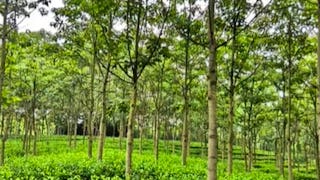Filter by
SubjectRequired
LanguageRequired
The language used throughout the course, in both instruction and assessments.
Learning ProductRequired
LevelRequired
DurationRequired
SkillsRequired
SubtitlesRequired
EducatorRequired
Explore the Plants Course Catalog

University of Leeds
Skills you'll gain: Environmental Monitoring, Environmental Regulations, Environment, Taxonomy, Environmental Science, Spatial Data Analysis, Estimation, Research, Scientific Visualization, Data Literacy, Exploratory Data Analysis, Data Collection, Biology, Physics

École Polytechnique
Skills you'll gain: Energy and Utilities, Electrical Power, Electric Power Systems, Environmental Resource Management, Water Resources, Time Series Analysis and Forecasting, Environment, Estimation, Hydraulics, Mathematical Modeling, Systems Of Measurement, Physical Science, Environmental Science
 Status: Free Trial
Status: Free TrialRice University
Skills you'll gain: Anatomy, Biochemistry, Biology, Chemistry, Medical Terminology, Molecular, Cellular, and Microbiology
 Status: Free Trial
Status: Free TrialUniversity at Buffalo
Skills you'll gain: Electrical Systems, Basic Electrical Systems, HVAC, Project Implementation, Energy and Utilities, Feasibility Studies, Cost Benefit Analysis, Cost Estimation, Return On Investment, Building Design
 Status: Free Trial
Status: Free TrialUniversity of Florida
Skills you'll gain: Land Management, Environment and Resource Management, Natural Resource Management, Environment, Environmental Issue, Water Resources, Environmental Science, Mitigation, Research, Biology

Universitat Autònoma de Barcelona
Skills you'll gain: Environment, Environmental Science, Social Justice, Environmental Issue, Biology, Natural Resource Management, Public Health and Disease Prevention, Social Studies, Diversity Awareness, Science and Research
 Status: Free
Status: FreeCoursera Project Network
Skills you'll gain: Simulation and Simulation Software, Visualization (Computer Graphics), Data Modeling, Mathematical Modeling, Biology, Systems Analysis, Environment
 Status: Free Trial
Status: Free TrialRice University
Skills you'll gain: Environment, Environmental Science, Life Sciences, Environmental Issue, Environment and Resource Management, Biology, Demography, Natural Resource Management, Estimation, Taxonomy, Experimentation, Data Collection, Research Methodologies

New York University
Skills you'll gain: Respiratory Care, Mindfulness, Respiration, Physical Therapy, Stress Management, Pulmonology, Research, Cardiology, General Science and Research, Kinesiology, Orthopedics, Biology, Preventative Care, Health Assessment, Vital Signs, Anatomy, Chronic Diseases, Neurology, Mental Health

University of New Mexico
Skills you'll gain: World Music, Cultural Sensitivity, Medical History Documentation, Culture, Cultural Diversity, Ancient History, Music, Intercultural Competence, Health Care, Liberal Arts
 Status: Free Trial
Status: Free TrialRice University
Skills you'll gain: Life Sciences, Biology, Taxonomy, Anatomy, Molecular Biology, Microbiology, Scientific Methods, Research
 Status: Free Trial
Status: Free TrialRice University
Skills you'll gain: Respiration, Anatomy, Respiratory Care, Patient Evaluation, Pathology, Internal Medicine, Nutrition and Diet, Biology
Plants learners also search
In summary, here are 10 of our most popular plants courses
- Aeroecology: Exploring Biodiversity with Radar: University of Leeds
- Hydro, Wind & Solar power: Resources, Variability & Forecast: École Polytechnique
- Anatomy & Physiology: Levels of Organization: Rice University
- Solar Energy Systems Overview: University at Buffalo
- Agroforestry I: Principles and Practices: University of Florida
- Women in environmental biology: Universitat Autònoma de Barcelona
- Building an Ecosystem model with Insight Maker: Coursera Project Network
- Introduction to Biology: Ecology: Rice University
- Engineering Health: Introduction to Yoga and Physiology: New York University
- Curanderismo: Global & Cultural Influences of Traditional Healing : University of New Mexico










